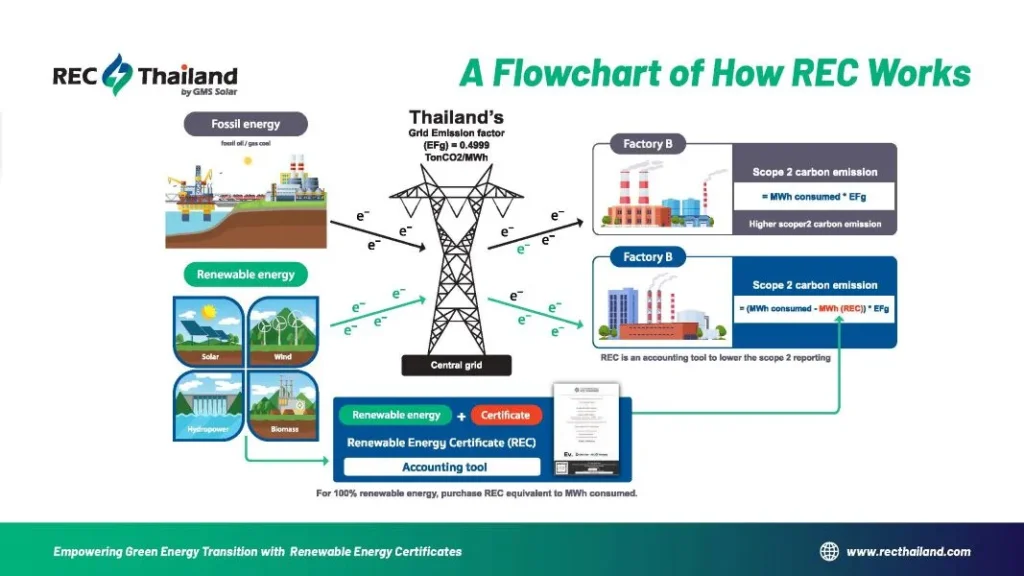REC VS Carbon Credit: Understanding the Difference
You may know that carbon credits can be used to offset your company’s carbon footprint, but do you know about Renewable Energy Certificates or ‘RECs’?
Know the Basics
While carbon credits help you reduce scope 1, 2, 3 emissions and reach carbon neutral goals, RECs specifically reduce scope 2 emissions and helps you reach renewable energy goals.
Renewable Energy Certificates (RECs)
A type of proof that renewable energy has been generated, usable by individuals or organisations to claim the environmental benefits of supporting clean energy.
Typically associated with the production of one megawatt-hour (MWh) of electricity from a renewable energy source.
Carbon Credits
A type of tradable permit or certificate that represents the reduction or removal of greenhouse gas (GHG) emissions.
Typically associated with projects or activities that contribute to reductions or removal of carbon dioxide (CO2) emissions
Detailing the Difference
Fundamentally, the 2 instruments are different not only in the nature of their purpose & usage, but also in the little details as outlined.
Renewable Energy Certificates (RECs)
Carbon credits
Measurement Unit
MWh
tCo2eq
Source
From Registered Renewable Energy Assets (Solar, Wind, Hydropower, Biomass)
From carbon reduction and carbon capture projects
Registries/ Standards
I-REC, TIGR
VERRA (VCS), Gold Standard, T-VER
Purpose
To support the development of Renewable Energy production
• To reliably track the green attributes of the electricity consumption
• To offer more choices for consumers who would like to purchase green electricity
• To capture or avoidthe release of Greenhouse gases.
Offsetting and Sustainability Reporting
Only concerns with scope 2 emissions only
Can be used to offset scopes 1, 2 & 3 emissions
Claim
Claiming usage of Renewable Energy when RECs are purchased.
Claiming reduction or avoidance of Greenhouse Gases of the organisation
What GMS Recommends
- While Carbon Credits & Renewable Energy Certificates (RECs) are different, with both having their own benefits & purpose, at REC Thailand, we recommend you consider purchasing RECs.
- In 2023 alone, the number of reports and awards for sustainable companies that used RECs (e.g., RE100, CDP, SBT) has been tremendous, as more and more organisations realize the significance and effectiveness of reducing their scope 2 carbon footprint.
How do RECs Work
- Electricity is produced from both fossil & renewable energy sources. When fed into the grid, each electron becomes indistinguishable. Purchasing a Renewable Energy Certificate or ‘REC’ tracks the ‘green attributes’ of renewable energy, enabling individuals or organisations to lower or completely reduce scope 2 carbon emissions, calculated as an offset of their energy consumption calculation.

4 Quick Questions
REC is an instrument that is acknowledged by Greenhouse Gas Protocol, SBT, ISO and RE100. It is internationally recognized, and REC Thailand is an authorized REC broker.
When you purchase a REC, you can make claims about your electricity usage and reduction in greenhouse gas emissions from electricity. This can be included in your ESG reports and sustainability reports.
Most importantly, the biggest advantage of buying a REC is that there is 0 CapEx requirements. You do not have to invest in any physical assets or undertake any form of financial risk or burden whatsoever.
REC Thailand provides Renewable Energy Certificates from both Thailand and Vietnam with full professional and technical service from our team.
Depending on the country that you are in, there are many advantages to buying your REC from the mentioned countries. If you are in Thailand, buying a REC locally is the most cost-effective solution and REC Thailand offers full local support.
If you are in another country, such as Singapore, one of the most difficult challenges in procuring renewable energy is high demand & limited supply. Thankfully, the Singapore Standard allows the use of Renewable Energy Certificates from Southeast Asia, which makes our RECs a very feasible and cost-effective option.
RECs offered by REC Thailand are official, authorized and competitively priced,
with full compliance and a clear onboarding process for all our partners.
At REC Thailand, we offer a variety of different RECs which includes Solar, Hydropower, Wind and Biomass. Our team would be more than glad to guide you through the pros of each.
Products
Location
Solar
Wind
Hydropower
Biomass / Waste to Energy
Thailand
2022
2023
2024
2023
2022
2023
2024
2022
2023
2024
Vietnam
2022
2023
2024
The Next Step
If after having read this pamphlet, you are interested to learn more, do get in touch with us through the following methods. Our team would be glad to get back to you to the onboarding process of purchasing your Renewable Energy Certificate.







